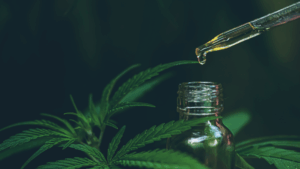Creatine is having a moment, and for a good reason. Backed by decades of research, it has become a staple for athletes as well as anyone seeking improved cognitive and physical performance. But there are other natural compounds making waves in the wellness world, which make up the cannabis plant.
While they work differently in the body, creatine and cannabis share surprising common ground. And, more importantly, both remind us that health is not about a singular “miracle cure”, but about layering multiple tools that can support our entire, internal systems.
The “Brain Boosters”: Cognitive and Mental Health Benefits
Creatine plays a role in providing energy through the creatine kinase (CK) and phosphocreatine (PCr) system. Several studies pointed to supplementation of creatine to assist with mental fatigue through improving cognition, executive function, and/or memory. Initial trials and few observational studies point to the alteration of depression-like behaviors with creatine supplementation.
One of the major cannabinoids found in the cannabis plant, cannabidiol (CBD), has gained the attention of the research community when it comes to influence on brain function. Recent research suggests that CBD use for those with pathological conditions may see improved cognitive processes. This includes improved attention, executive function, working memory, and episodic memory.
For neurodegenerative diseases, CBD has shown to be a promising therapeutic agent. Several studies point to the ability of CBD to inhibit progression of Alzheimer’s disease. Although the mechanisms of the neuroprotective effects have not fully been discovered, research points to CBD’s role in reducing neuroinflammation, reducing oxidative stress, and improving cognitive performance by preventing the development of social recognition deficit.
Higher resting hippocampal blood flow is associated with better memory performance. Results were published in 2020 from a randomized, crossover, double-blind study where 15 healthy participants were administered oral CBD to assess how CBD influences cerebral brain flow in regions involved with memory processing. Their findings suggest that CBD does increase cerebral brain flow to the key regions involved in memory processing, particularly in the hippocampus.
Data indicate that repeated administration of CBD may produce an effect that is consistent with results from studies testing traditional anti-anxiety and antidepressant medications. These are known to be clinically relevant findings as CBD is known to benefit while exhibiting few side effects, supporting the initiation of clinical trials testing the efficacy of CBD-based compounds for the treatment of mood disorders.
The serotonergic mechanism of CBD is distinct from commonly used antidepressant medications in that it does not appear to produce symptoms of withdrawal. CBD has also been shown to synergize with other serotonergic medications. Data suggests that CBD could facilitate the antidepressant effect induced by these antidepressant drugs, therefore allowing the SSRIs to be administered at lower doses, resulting in fewer side effects.
In a recently published observational study, it was found that medicinal cannabis use was associated with lower self-reported depression. Initiation of medicinal cannabis during the follow-up period was associated with significantly decreased anxiety and depressive symptoms, an effect that was not observed in Controls who had not initiated cannabis use.
“Brain Booster” Takeaway: Both creatine and cannabinoids from the cannabis plant continue to be studied for their benefit to neurodegenerative conditions and improving quality of life for high-stress environments that can impact cognitive function and mental health.
Performance and Recovery: From Gym Gains to Restorative Sleep
As we age, we are susceptible to losing strength, muscle mass, and bone mass while increasing body fat. Several studies performed in older adults, older men, and postmenopausal women suggest that creatine supplementation may promote gains in muscle mass and strength as well as bone density. A recent meta-analysis on the effects of creatine supplementation on body composition found that it may help maintain muscle mass while promoting fat mass loss.
When understanding the effects of creatine on sleep, a study published in 2006 reported that sleep-deprived participants better maintained random movement generation, time to react to choices, mood state, and balance when using creatine supplements.
For recovery, CBD is looked to for anti-inflammatory, reducing oxidative stress, and decreasing muscle soreness. Cannabigerol (CBG) and Cannabidiolic acid (CBDA) may also offer potent anti-inflammatory and analgesic effects to promote healing post-workout. These benefits may also lead to improved sleep, by limiting stress-induced inflammation and pain.
Cannabinoids cannabinol (CBN), delta-9-tetrahydrocannabinol (THC) are cannabinoids more often regarded for their sleep-promoting benefits, which may be realized at even micro-dosed amounts.
Performance and Recovery Takeaway: While creatine is more widely known for muscle building and fat loss (“gains”) several cannabinoids have been studied for their recovery benefits. Both may work together to enhance overall performance.
Metabolic Health: Focusing on the Body’s Ability to Regulate
Evidence has rapidly accumulated over time that creatine supplementation reports to help lower cholesterol, triglycerides, reduce accumulating fat on the liver, serve as an antioxidant, enhance glycemic control, and reduce the risk of heart disease.
Given studies related to creatine and glucose management, there is sufficient evidence to suggest that supplementation of creatine may enhance glucose uptake and insulin sensitivity, particularly when simultaneously initiating in an exercise program.
Currently, there are very few natural pharmaceutical solutions available for the treatment of metabolic syndrome. In 2023 researchers published findings analyzing a full-spectrum cannabis oil (CBD:THC, 2:1) to understand the usefulness of cannabis in metabolic syndrome, notably for blood pressure, serum metabolic parameters, and liver damage. Their study showed data that resulted in significant improvements across several metabolic syndrome parameters in animal models fed a sucrose-rich diet. They observed lower systolic and diastolic blood pressure, decreased serum levels, improved liver abnormalities, and pain relief.
Researchers in 2017 reported CBD’s impact on blood pressure in healthy humans following an oral dose of 600mg showing that increased blood pressure levels as a result of stressful situations were weakened. Over time we have seen repeated actions of acute or chronic CBD treatment in reducing the cardiovascular response to models of stress, making it known to be an anxiolytic.
For diabetes prevention, tetrahydrocannabivarin (THCV) has recently been looked to for aiding weight loss. There is also research to show the promise of CBD and THCV in reducing insulin resistance and moderating blood sugars.
Metabolic Health Takeaway: Both creatine and cannabis compounds are showing to support metabolic regulation, a key to long-term health.
Conclusion: Layer, Don’t Lean
Creatine isn’t the answer. Neither is cannabis. But together they reflect a modern, integrative approach to health that supports systems rather than symptoms. If you are looking to enhance performance, energy, and mood, the most sustainable approach is layering lifestyle, diet, movement, and the right supplementation for you.
Curious about how to start incorporating cannabinoids into your wellness routine safely and effectively? Learn more with us at Realm of Caring.





